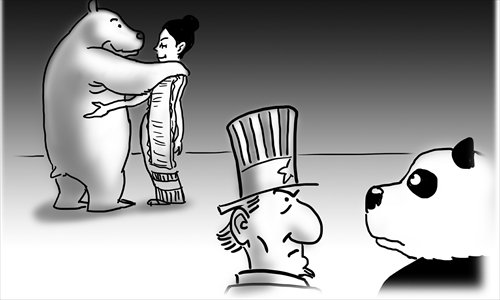Thai junta looks to Moscow to balance Beijing and Washington

Illustration: Liu Rui/GT
Thai Deputy Prime Ministers Prawit Wongsuwan and Somkid Jatusripitak met with Russian Prime Minister Dmitry Medvedev and other Russia high-level officials during their Russia visit last week. The two sides reached broad consensus on strengthening security and economic cooperation.
The junta led by Prime Minister Prayut Chan-o-cha, since it took power in 2014, has been actively promoting Thailand-Russia relationship, which has seen significant progress in recent years.
Medvedev officially visited Thailand in April 2015, becoming the first Russian prime minister to go to Bangkok since the collapse of the Soviet Union. The Thai government announced a plan to purchase Russia-made Mi-17V-5 helicopters in September last year. It was the first time for Bangkok to purchase Moscow-made helicopters.
Before Prawit's Russia visit, the Thai junta claimed that it intends to buy more Mi-17V-5 helicopters, and may purchase Moscow-made T-90 tanks to replace the Ukrainian tanks.
Thailand has both security and economic needs to deepen its ties with Russia. Yet the closer Bangkok-Moscow relationship is more attributed to Thai traditional diplomatic thinking about striking a balance among major powers.
Bilateral Thailand-Russia trade volume has reached $2.4 billion in 2015, occupying only 0.56 percent of the total foreign trade volume of Thailand. The two sides have limited investments as well. Bangkok-Moscow economic cooperation may have high potential in the medium and long term. But little progress can be achieved in the immediate future.
Given the limited defense acquisition and a lack of anti-terrorism intelligence sharing and personnel training, it is tough for Bangkok to find security guarantees.
For Thailand, an ambitious Russia, which has a weak basis in Southeast Asia, will be an important pivot in leveraging the China-US game.
Thailand-Russia cooperation will make it more risky for the White House to keep its distance from Bangkok, prompting the US to improve its ties with Thailand. As Washington's traditional military ally in Southeast Asia, Bangkok plays a significant role in the US rebalance policy in the Asia-Pacific region.
Concerned about Thailand playing the China card, the US only criticized and diplomatically distanced itself from Thailand as a response to the nation's coup. The White House has not imposed tough sanctions on the junta, nor stopped the landmark US-Thailand Cobra Gold military drills. The US has made substantial concessions for the US-Thailand alliance.
However, for Prayut's government, the US-led Western diplomatic estrangement has seriously squeezed Thai space in international affairs, making the nation's bid for non-permanent membership of the UN Security Council even harder.
So now they're playing the Russia card, trying to find support from the north, and meanwhile putting more pressure on US Asia-Pacific strategy and prompting the White House to change its attitude to Thailand.
Thailand-Russia cooperation, on the other hand, will stimulate Beijing to compete for cooperation with Bangkok, impelling China to provide more favorable cooperative conditions to Thailand.
Beijing-Bangkok strategic cooperation serves as an important impetus for Thai social and economic revival. The Prayut government, which strives to address domestic reforms, anticipates China to be more generous. This is also the reason for the suspension of the China-Thailand railway project, which has already gone through nine rounds of negotiation.
By actively developing Thailand-Russia cooperation, Prayut's government is sending a political signal to China that Beijing is not the only candidate and Moscow may replace Beijing in filling the strategic vacuum caused by the new US-Thailand distance.
During the Russia-ASEAN summit, to be held in May, Bangkok is highly likely to be more active in directing Moscow into Southeast Asia. This will not only strengthen Bangkok's role as a gateway in the ASEAN community, but also pave the way for the nation to bargain with Beijing in strategic cooperation.
The author is an associate research fellow from the National Institute of International Strategy at the Chinese Academy of Social Sciences. opinion@globaltimes.com.cn